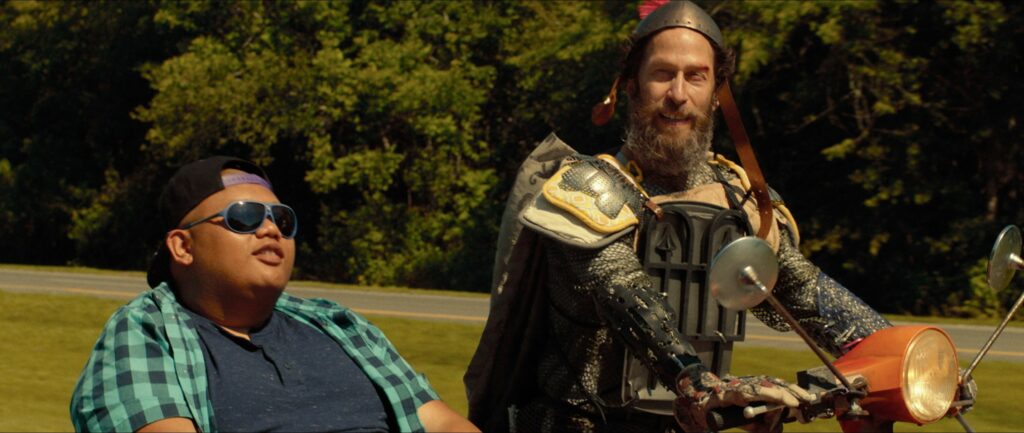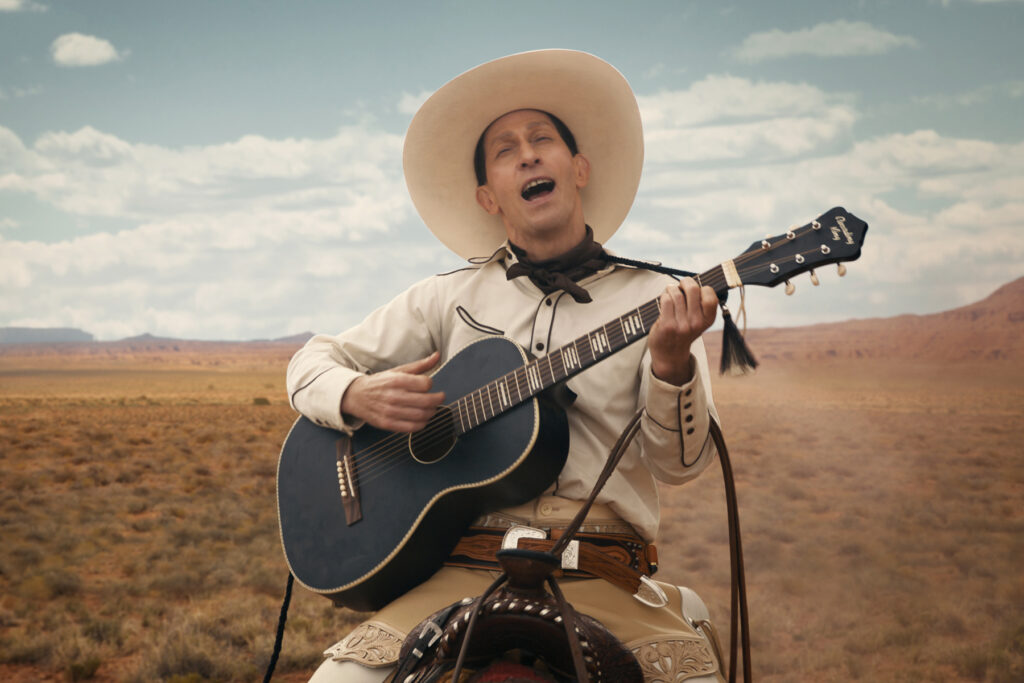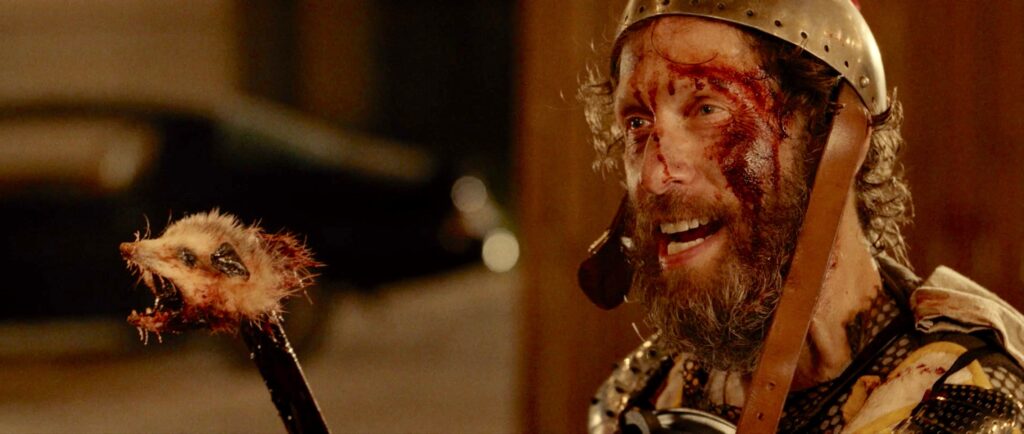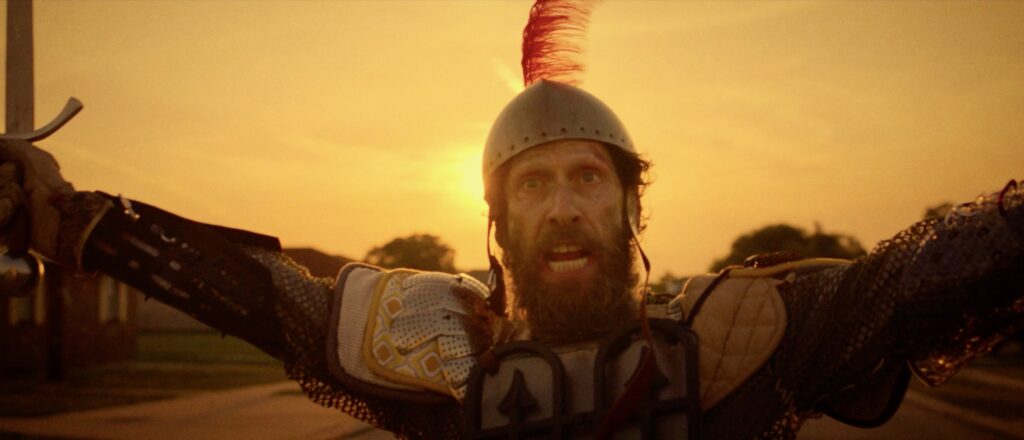Before a great story can be told, it must be lived. Down on his luck, Danny (Tim Blake Nelson) escapes the world around him by immersing himself in fantasy novels, tales of noble knights and righteous duels which bring him comfort and respite from the humdrum everyday.
Diving a little too deep, he soon begins to believe himself to be a great knight and adventurer in his own right. Grabbing a makeshift armour and his sword, then roping in his trusty squire Sancho (Jacob Batalon), the two embark on the adventure of a lifetime.
Outtake had the pleasure of speaking with Tim Blake Nelson, the Coen brothers regular best known for his roles in O Brother, Where Art Thou?,
the HBO series Watchmen, and the upcoming Venice Film Festival feature Old Henry.

You’re currently filming, is that correct?
Tim Blake Nelson: Yes, I’m doing this Guillermo del Toro project right now, and I’m suddenly very much in his world. It’s three projects in a row with him.
Over here in the UK, The True Don Quixote has finally been released. What was it that most attracted you to this project?
Tim Blake Nelson: When I read the script, I immediately understood that this filmmaker, Chris Poche, got the novel and that he had a lot of personal skin in the game, in terms of the storytelling – he refracted it through his own experience as a guy from Louisiana who knew the terrain really, really well.
And even beyond being funny, which the Cervantes novel obviously is, it also captured the depth and poignancy that distinguishes the original. I just knew I’d be in good hands playing a wonderfully challenging part.
How did you go about preparing for the role?
Tim Blake Nelson: Funnily enough, I did The Ballad of Buster Scruggs and The True Don Quixote back-to-back. I literally left Don Quixote and was in New Mexico with the Coen Brothers within less than a month. And I knew back in January of that year that that was going to be my schedule, so I had over seven months to prepare for both roles. I’m at the stage now in the way that I work as an actor where, if I go onto a set, no matter how large the role is, I like to know the entire part.
You know Elvis Costello used to do these concerts where he would spin a wheel with all his song titles on it and, whatever song came up, he would play that? I have the attitude that I want to know the script and the part so well that I can just show up and no matter the scene, I know it and can shoot it. And it has just allowed me to focus on what’s important while the cameras are rolling. I’m not having to wonder about lines or cues, or what the character wants – I just know it so well that I’m immediately grounded.
Which is my long-winded way of saying that I prepared for both roles over seven months. And with Don Quixote, that was a lot of words, a wild journey to try and wrap my head around, and also being able to do a headstand naked. And I couldn’t even do a headstand with clothes on, so I was doing a lot of yoga and getting into shape. I also had to lose a bit of weight because by the end of the movie, the character is meant to be starving and weak. And I wanted a more slender figure for Scruggs as well, so that worked out. And for Buster Scruggs, it was pistol twirling and I needed to learn to play the guitar. So that was a really great first half of that year, just waking up every day and concentrating on learning these parts.

Does prepping for two roles at once pose any kind of challenge in terms of overlap, or is it nice to have two things going on to break up the routine?
Tim Blake Nelson: It’s both. At the time I was 54 years old – and sure, it’s challenging – but I get to wake up at that age and test my brain and exercise it in that way… it made me feel like one of the luckiest people around. That’s the way I want to be living my life. So, it was nothing to complain about, it was something to rejoice about. And now I can play the guitar and do a headstand! And twirling pistols.
Does that skill come in handy often?
Tim Blake Nelson: [Laughs] Well you know, I just played a part in a movie that’s going to be coming out in England later this year and is about to premiere at the Venice Film Festival, called Old Henry, in which I twirled pistols. So, I was ahead of the game.
In a similar vein, you and Jacob Batalon make an unexpected comedic duo – how did you go about finding your rhythm together? Was there much in the way of chemistry prep?
Tim Blake Nelson: It was easy with Jacob, he’s just a wonderful guy. Just an easy going, happy, preternaturally decent human being. He’s great. And I’m so stupid [laughs], I didn’t know much about Jacob and what a fine figure he cuts in the Spider-Man movies. And I remember seeing him a bit socially in New Orleans and thinking, “Man, this guy is a player! Jeez, he just has no inhibition, what is the deal? Everybody loves Jacob!” And then I saw what he does in the Spider-Man movies, and I got it. He’s just great and it was really, really easy.
I rode a motorcycle when I was young, but driving that moped with Jacob on the back, I was really afraid I was going to kill us. But we were okay, and he’s great. I love Jacob and he’s wonderful in the movie.
And that brightness he brings to his roles makes Kevin’s character so empathetic in the way he interacts with Don Quixote. There’s a lot of understanding and very little judgement.
Tim Blake Nelson: That’s right, and to find that sort of innocence and openness while the cameras are rolling is not easy. And he does it naturally, you never feel like he’s putting it on.
Throughout the years there’s of course been many adaptations of Don Quixote, most recently Terry Gilliam’s film. What do you think is the enduring appeal of Don Quixote, the character?
Tim Blake Nelson: Don Quixote was written to send up chivalry and chivalric stories, and that makes it very funny. It was probably funny when it came out in ways that we are incapable of understanding right now, because this chivalric code is only residually there.
Now it’s considered chauvinism in a lot of ways, even in its more salutary aspects – like being more polite to women than you would be to men. But what allows the story to endure is that this stuff falls away, that parodic aspect of the novel falls away. That quixotic nature of Don Quixote or in other words, the naïve optimism of the guy that simply will not give in even as mayhem occurs all around him… I think we want that as human beings. We identify with that character, we love that character, and we want that for ourselves. So we rehearse life through the exploits of Quixote and, as long as we’re fully human, we’re going to appreciate that story.
It’s obviously a seminal work of Western literature that’s lent itself to a multitude of interpretations throughout history. For instance, while it may have been considered a comedy by the author’s contemporaries, post-French Revolution it was then seen as an anti-establishment novel. In light of today’s political climate, do you think the novel has anything particularly urgent to say?
Tim Blake Nelson: I think that the gender politics aspects of it resound today. Quixote is caught up in something that is dying, which is what we call chivalry – even in its modern iterations. And it is something that is so offensive to many, and I experience it in my own marriage – I’ve been married for 27 years, but I’ve been with my wife for 32 years – and she simultaneously wants me to open doors for her and carry her bags, etc. but she’s a college professor and asserts herself as an independent woman.

And I buy into all of it because I’m in love with her, but we’re trying to find our footing in terms of the dissonance between both of those ideas. Sometimes I think, if I open the door for you, is that an insult or is it something nice to do? And those little quotidian areas of conflict have much larger ramifications. Why hasn’t the United States elected a female president? What’s inhibiting that? And if you think about Quixote and Dulcinea in the novel, and you think about the distance we’ve gone between that and a Margaret Thatcher, or an Angela Merkel, and hopefully the imminence of an American woman president – I think seeing Don Quixote in that light is really interesting. So, I’d say gender politics. What do you think about that?
I’m not entirely convinced by the gender politics commentary but, as a central aspect, I think what resonates more with me is the continued appeal of escapism. Don Quixote wants to escape the mundane, and I can’t help but see that all around us today, where so much of our culture and entertainment is about leaving reality behind – as often and as completely as possible. But I guess that has a lot to do with my perspective as a critic, where I’m so immersed in a world of bingeing content and huge superhero tentpole films.
Tim Blake Nelson: I guess my response to that – and that’s really well observed – is that the beauty of Quixote is that he creates his own avatar and lives it physically, and forces Sancho Panza to do the same. He’s not in a simulation, he’s creating all of it. And that’s kind of remarkable; it’s almost as if, instead of playing a videogame – and I have children who spend an enormous amount inside of these avatars – he does it with his own imagination. And because of our conversation, that’s a way of thinking about Don Quixote that I’ve never considered. That’s interesting. I’m taking what you said and thinking about it in a slightly different way, inspired by what you’ve said… so yes, I would add that to the resonance it has today.

I suppose there’s a reason why a novel like that has endured so long, and it has to do with the number of ways you can approach it. On that note though, a lot of roles you’ve taken on throughout your career have been adaptations of other works – Holes, Homer’s Odyssey for O Brother, Where Art Thou?, Watchmen, to name a few. How do you approach something like that, when you have to balance your understanding of the source material, without allowing it to pollute the script’s interpretation?
Tim Blake Nelson: That’s the trick, isn’t it? I approach it with complete delight, and sometimes it’s clumsy and doesn’t work. I did a movie several years ago that was based on As I Lay Dying [William Faulkner novel], and I played Anse, who is a character that’s very far from me. He’s the patriarch of the family that’s moving across Mississippi, carrying that matriarch’s corpse to her ancestral cemetery. I went to Faulkner and the novel talked about how Anse was slack-jawed all the time, and I just went to town with that in terms of the characterisation. Luckily, James [Franco] and I are very close, and he sent me a cut of the movie while they were editing. I saw I had just overdone it, and that was because I had gotten lost in the source material without understanding how it was going to ramify with the screen performance, particularly since there was such elaborate characterisation involved. And I’m so lucky; I said, “James, please. It’s too much,” and we went and crafted the edit to save the movie from these mistakes I’d made.
It’s always the trick – which your question points to – with source material, of not showing your homework and instead meeting the script on its own terms. It’s ensuring you are responsible with your research, in a way that the work you’ve done can never be intuited beyond you just inhabiting the character in the film version. There were times at which I thought, “My God. Maybe it would have been better if I had never gone back to Faulkner.” I of course don’t believe that, but it was a tempting thought.
If you’re working so hard not to show your homework, as you put it, do you think there are still ways in which the source material informs your performance for the better?
Tim Blake Nelson: Yes, it does. You’ve just got to work with that material in a deeper way. It’s like reading a great novel – when you read an Ian McEwan novel. What’s interest about him is, for example with a novel like Saturday, he goes into a lot of medical science. And you just assume that Ian McEwan just knows all that, but of course it’s heavily researched – it’s just that the writing is so fluid, so masterful, and there’s such authority that you never think about the research. You’re just lost in it. I think that’s the kind of coherence that one wants to achieve. And I guess that when you’re showing your research, it’s incoherent. You want the mechanics of the storytelling to disappear. You want them to be hidden.
The True Don Quixote is out now on digital platforms.
